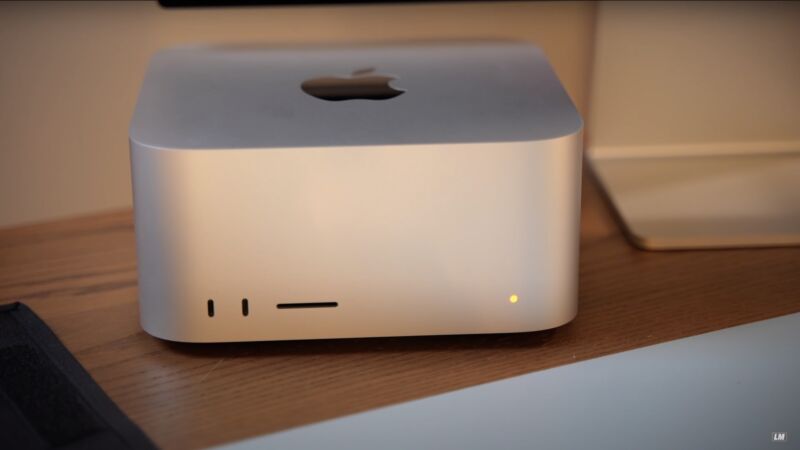
Enlarge / You'll see the Mac Studio's blinking orange SOS light if you try to change its SSD modules. Here's why. (credit: Luke Miani)
Apple's new Mac Studio desktop began arriving in customers' hands last week, and some of those customers wasted no time in taking the machine apart. Among the more interesting discoveries was the sheer size of the M1 Ultra and its voltage regulator modules (VRMs); in addition, it seems that the Studio includes removable storage rather than the soldered-down NAND chips that most Macs use. In theory, this could make the Mac Studio the first new Mac (outside of the Mac Pro) to support upgradeable storage in quite a while.
Because the Studio's SSD slots aren't compatible with regular M.2 SSD sticks that you might use in a PC, YouTuber Luke Miani decided to test the Studio's removable storage by swapping storage from one Studio into another. He found that, while the drives are physically swappable, his Mac Studio wouldn't boot after the fact—the desktop's power LED would only flash an amber-colored "SOS" pattern. This persisted both when he tried to install the second SSD module in the Studio's second storage slot and when he tried to install an SSD from one Studio into the other Studio's main SSD slot.
"What Apple is doing here with the Mac Studio is simply inexcusable," Miani concluded. "Apple does not care about your right to repair, make no mistake. What we've seen here today is that Apple is intentionally, deliberately restricting your access to your own device. In my opinion, this is actually worse than soldering the storage onto a logic board."
Read 20 remaining paragraphs | Comments

Enlarge / You'll see the Mac Studio's blinking orange SOS light if you try to change its SSD modules. Here's why. (credit: Luke Miani)
Apple's new Mac Studio desktop began arriving in customers' hands last week, and some of those customers wasted no time in taking the machine apart. Among the more interesting discoveries was the sheer size of the M1 Ultra and its voltage regulator modules (VRMs); in addition, it seems that the Studio includes removable storage rather than the soldered-down NAND chips that most Macs use. In theory, this could make the Mac Studio the first new Mac (outside of the Mac Pro) to support upgradeable storage in quite a while.
Because the Studio's SSD slots aren't compatible with regular M.2 SSD sticks that you might use in a PC, YouTuber Luke Miani decided to test the Studio's removable storage by swapping storage from one Studio into another. He found that, while the drives are physically swappable, his Mac Studio wouldn't boot after the fact—the desktop's power LED would only flash an amber-colored "SOS" pattern. This persisted both when he tried to install the second SSD module in the Studio's second storage slot and when he tried to install an SSD from one Studio into the other Studio's main SSD slot.
"What Apple is doing here with the Mac Studio is simply inexcusable," Miani concluded. "Apple does not care about your right to repair, make no mistake. What we've seen here today is that Apple is intentionally, deliberately restricting your access to your own device. In my opinion, this is actually worse than soldering the storage onto a logic board."
Read 20 remaining paragraphs | Comments
March 23, 2022 at 12:13AM

Post a Comment